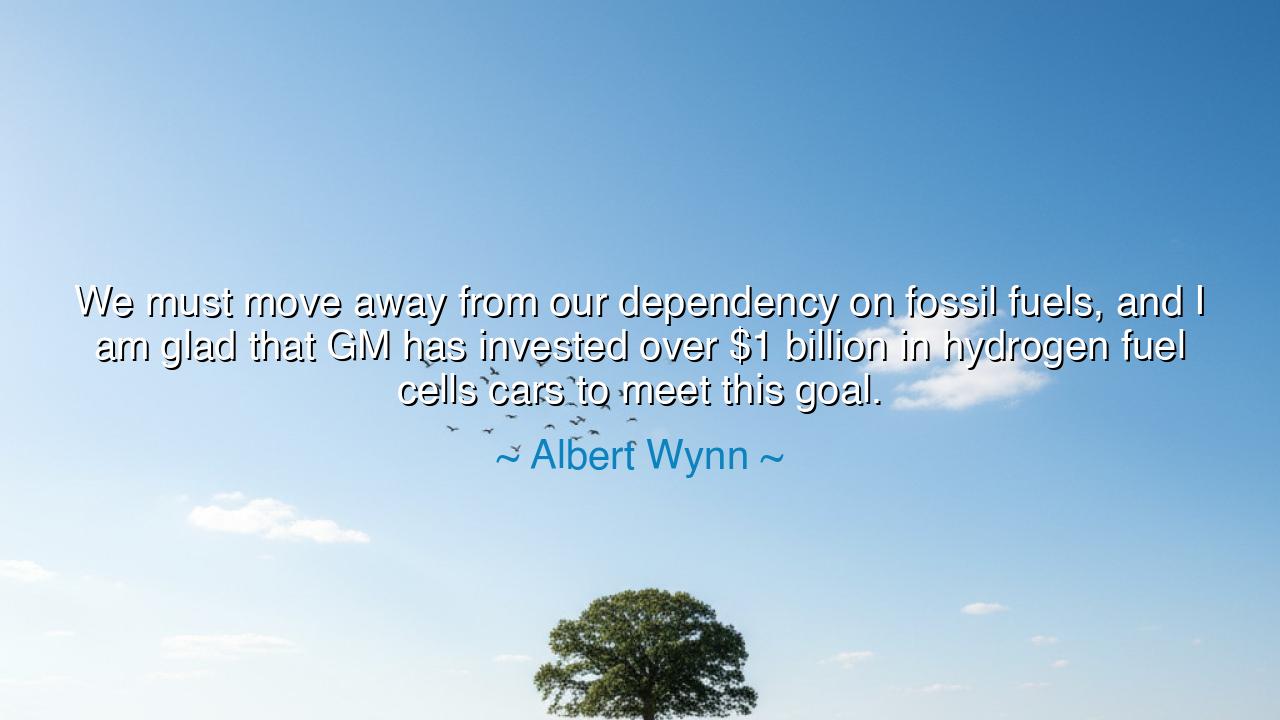
We must move away from our dependency on fossil fuels, and I am
We must move away from our dependency on fossil fuels, and I am glad that GM has invested over $1 billion in hydrogen fuel cells cars to meet this goal.






In the councils of elders, where firelight once flickered on stone walls, it was taught that a wise household changes lamps before the oil runs dry. Thus Albert Wynn’s charge—“We must move away from our dependency on fossil fuels, and I am glad that GM has invested over $1 billion in hydrogen fuel cells cars to meet this goal.”—rings like a bell for our time. He speaks not merely of machines, but of vows: a people choosing the long road of resilience over the short road of ease; a market bending its genius toward breath, water, and sky; a nation deciding that tomorrow deserves more than yesterday’s smoke.
Hear the sentence in two halves. First, the severing: we must loosen our dependency on fossil fuels, those ancient suns trapped in rock, whose burning warms our houses and our seas alike. Dependency is a chain both golden and rusting—profitable in the hand, ruinous in the long arithmetic of climate, health, and war. Second, the binding: the embrace of a new craft—hydrogen, fuel cells, and whatever honest devices can turn wind, sun, and water into motion without ash. Between these halves lies the work of a century: reweaving the everyday so that power flows without poison.
Consider a parable from the age of harbors and lamps. Once, coastal towns lit their nights with whale oil; ships roamed far for a fuel that dimmed even as demand grew. Then a new light arrived—first gas, then electricity—each promising brightness without the hunt. The wise did not wait for the last whale; they built wires and turbines while the old lamps still burned. So too today: if we would spare our children the scramble of scarcity and the fever of a crowded air, we must build the next grid while this one still hums.
Let a modern tale anchor this counsel. In a wind-scoured valley, a transit agency took delivery of a small fleet of fuel cell buses. At first, drivers doubted; mechanics frowned at unfamiliar tanks; citizens sniffed at costs. Yet routes were chosen, training given, and hydrogen drawn from renewable power began to flow. Winter passed; the buses kept their schedules; lungs along the corridor measured quieter days. What seemed extravagant became ordinary; what was trial became template. Here policy and industry met the street, and the street remembered the favor.
Wynn’s nod to GM—the magnitude of $1 billion named aloud—is not mere cheerleading; it is an invocation of responsibility. When great workshops turn their tools toward clean motion, they do more than sell—they signal. Suppliers learn new arts; students choose new majors; cities find partners willing to shoulder risk. The elders would say: “Where the smith sets his anvil, there the village sets its hope.” Investment, when yoked to integrity, becomes a public oath.
But let us keep our balance. Hydrogen is a noble servant and a demanding master. Its promise blooms where electricity struggles to carry heavy loads over long miles, where storage must be swift, and where industrial heat defies easy taming. Its pitfalls lurk where the gas is made from old fuels rather than green; where leaks waste the gift; where haste outruns safety. The lesson is not to kneel before a single altar, but to build a chorus: batteries for many roads, fuel cells for hard ones, efficiency as the quiet sovereign of them all.
From this saying, take a clear law and a set of tasks. Law: change what powers your life before what powers your life changes you. Tasks: for households—reduce, electrify, and choose machines that sip; for cities—procure clean fleets, zone for charging and hydrogen safely, and link transit to dignity; for firms—invest where returns include cleaner air and sturdier supply; for lawmakers—tie public dollars to public benefits, so that innovations lift wages, skills, and the blue of the sky together. Do these things and Wynn’s call will cease to be a wish and become a witness: a people who move away from dependency, who harness hydrogen where it shines, who honor the earth not with apologies but with better engines—and who, in doing so, light the road for those yet to come.






AAdministratorAdministrator
Welcome, honored guests. Please leave a comment, we will respond soon